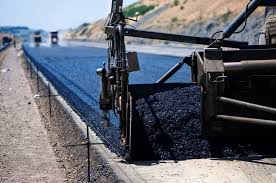Gilsonite In Road Construction
Gilsonite, Hard Asphalt or Hard Asphaltum is used as a performance-enhancing agent for asphalt mixes.
Gilsonite-modified paving mixes achieve higher PG grades and incorporate perfectly into the asphalt blend with no need for high shear milling as is the case with many other modifiers. Gilsonite, "Natural asphalt, Natural Bitumen" can partially or totally replace, or complement, the use of SBS polymers in modified asphalts at a fraction of the cost. Gilsonite-modified asphalts have higher stability, reduced deformation, reduced temperature susceptibility and increased resistance to water stripping than non-modified asphalts. Gilsonite, "Natural asphalt, Natural Bitumen" is also used to make both solvent-based and emulsion pavement sealers with superior appearance and weathering properties.
Gilsonite CH-108R
Principal Applications
Natural Asphalt , Natural Bitumen Grades
| Typical Properties | |
| Softening Point (ASTM E28-92) | 165-185°C 329-365°F |
| Ash (ASTM D271-70M) | <16% |
| Moisture | <1.5% |
| Penetration (25°C, 100 gm, 5 sec.) | 0-2 |
| Color in Mass | Black |
| Flash Point (COC) | 316ºC; 600ºF |
| Nitrogen | 3% Typical |
| Sulfur | 3-6% |
| Specific Gravity | 1.04 |
Gilsonite CH-109P
Principal Applications
Natural Asphalt , Natural Bitumen Grades
Modifier for hot mix binders to achieve broader Useful Temperature Interval (UTI) and improve high temperature properties of bitumen. CH-109P was developed for use in conjunction with, or as a substitute for, polymers in asphalt.
| Typical Properties | |
| Softening Point (ASTM E28-92) | 185-205°C 329-365°F |
| Ash (ASTM D271-70M) | <10% |
| Moisture | <1.5% |
| Penetration (25°C, 100 gm, 5 sec.) | 0-2 |
| Color in Mass | Black |
| Flash Point (COC) | 316ºC; 600ºF |
| Nitrogen | 3% Typical |
| Sulfur | 3-6% |
| Specific Gravity | 1.04 |
Gilsonite CH-110K
Principal Applications
Natural Asphalt , Natural Bitumen Grades
Modifier for hot mix binders to achieve broader Useful Temperature Interval (UTI) and improve high temperature properties of bitumen. CH-110K was developed for use in conjunction with, or as a substitute for, polymers in asphalt.
| Typical Properties | |
| Softening Point (ASTM E28-92) | 165-220°C 329-365°F |
| Ash (ASTM D271-70M) | <3% <5% Guaranteed |
| Moisture | <1.5% |
| Penetration (25°C, 100 gm, 5 sec.) | 0-2 |
| Color in Mass | Black |
| Flash Point (COC) | 316ºC; 600ºF |
| Nitrogen | 3% Typical |
| Sulfur | 3-6% |
| Specific Gravity | 1.04 |
| Typical Particle Sizing (ASTM E11-70) | |
| SIZE A | |
| % Retained (Cumulative) | |
| 30 mesh | <=0.1% |
| 50 mesh | <=1.3% |
| 100 mesh | <=8.5% |
| 200 mesh | <=30% |
| Typical Particle Sizing (ASTM E11-70) | |
| SIZE B | |
| % Retained (Cumulative) | |
| 0 mesh | <=0.1% |
| 30 mesh | <=1.3% |
| 50 mesh | <=8.5% |
| 100 mesh | <=30% |
| SIZE C | |
| % Retained (Cumulative) | |
| 0 mesh | <=1% |
| 10 mesh | <=5% |
| 30 mesh | <=10% |
| 40 mesh | <=30% |
SUMMARY DESCRIPTION:
Special Polymer Gilsonite " Natural Asphalt, Natural Bitumen" improves the high temperature properties of asphalt and is a reinforcing agent for hot mix asphalt (HMA). This grade has superior purity and a finer particle size distribution compared to conventional Gilsonite grades. It can be directly blended into the asphalt binder. CH109P R K widens the Useful Temperature Interval (UTI) of the finished product and is a cost-effective means to either substitute or complement polymer-modified asphalt (PMAs). CH109P R K can also be added at the asphalt plant during manufacture of HMA.
Gilsonite is a natural asphalt, natural Bitumen and is fully miscible in the base binder, thus the final Gilsonite-modified asphalt (GMA) is inherently phase stable. GMAs produce paving surfaces with higher stability, superior rut resistance, improved resistance to water stripping, and reduced temperature susceptibility.
Generally, asphalts are characterized by their physical properties:
Softening Point: Range of temperatures that the asphalt softens using a ring and ball technique. Sometimes thought of as
the melting point. ASTM D-36
Penetration (at a prescribed temperature): How far a weighted needle or cone will sink into the asphalt during a set period of time. ASTM D-5
Viscosity (at a prescribed temperature): An indication of how thick or thin the liquid asphalt is at various temperatures (measured in poises, centipoises (cps), centistokes (cSt), or SSU). ASTM D-2170, D-88
Flash Point: Temperature that the heated asphalt will flash (ignite briefly). ASTM D-92
The softening point and penetration are usually the most commonly used measurements for classifying an asphalt's properties. Generally, when comparing asphalts, as the softening point increases, the viscosity also increases, the penetration drops and the flash point rises.
PACKAGING Gilsonite:
SPG-350 is available in 50 lb. and 25 kilo net multi-ply paper bags, which may be palletized and stretch wrapped. It is also available in meltable plastic bags, bulk loaded trucks, and in a variety of bulk bag sizes.
HEALTH & SAFETY:
Gilsonite, "Natural asphalt, Natural Bitumen" is a naturally occurring hydrocarbon. There is no known history of dermatitis, lung disease or other health problems associated with handling of Gilsonite as supplied. Dusts are subject to combustion. Normal precautions used with flammable materials apply.


